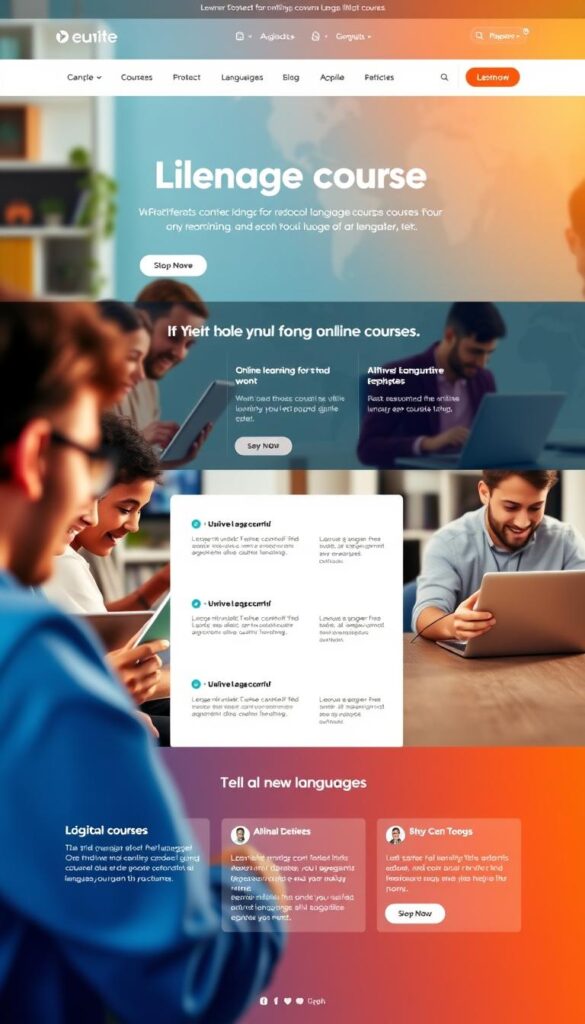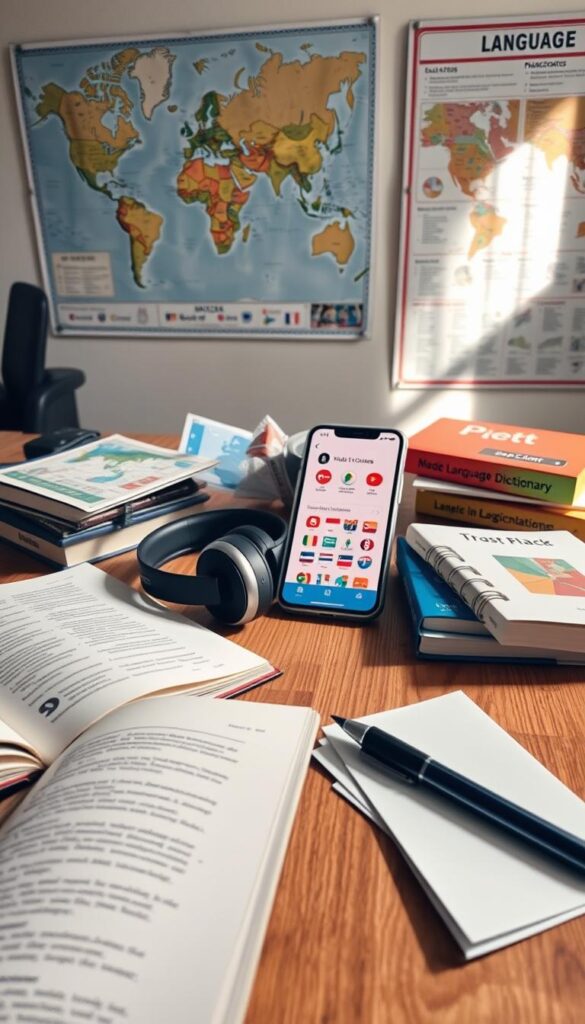Unlock Your Language Skills with These Tools
Learning a new language can seem tough, but the right language learning software makes it easier and fun.
Imagine talking like a native, reading books in their original language, or traveling without worries. Duolingo, SmallTalk2Me, and Talkio AI are tools that help you reach your language goals.
These platforms have cool features like interactive exercises and learning paths made just for you. They fit different learning styles and needs.
Key Takeaways
- Good language learning software boosts your vocabulary, grammar, and speaking skills.
- Duolingo, SmallTalk2Me, and Talkio AI are top choices for language learners.
- Personalized learning and real-life content make studying languages fun.
- Language study tools have many features for all kinds of learners.
- Choosing the right tools can turn language learning into a fun and doable journey.
Why Use Language Study Tools?
In today’s digital world, language learners have many tools to help them. Online courses and apps are key for those wanting to get better at languages quickly.
Benefits of Enhanced Language Learning
Language study tools offer a better learning experience. They have fun exercises and plans made just for you. For example, Duolingo’s games and tailored learning help a lot.
- Interactive exercises that make learning fun and engaging
- Personalized learning plans that adapt to the learner’s pace
- Real-time feedback that helps learners track their progress
Improving Retention and Recall
These tools also help you remember what you’ve learned. They use tricks like spaced repetition to keep information in your mind. This is great for learning new words and grammar.
- Spaced repetition to help learners retain information over time
- Memory aids such as flashcards and mnemonics to enhance recall
- Regular practice exercises to reinforce learning
Accessibility and Convenience
Another big plus is how easy these tools are to use. You can learn from anywhere, anytime, as long as you’re online. This makes it simple to add language learning to your busy life.
- Access to language learning resources 24/7
- The ability to learn at one’s own pace
- Opportunities to connect with other learners and native speakers
Popular Language Study Tools to Consider
The world of language learning has changed a lot with new tools. Now, learners have many ways to learn, fitting their own style.
Duolingo: Gamified Learning
Duolingo is a top choice for learning languages. It makes learning fun with games and quizzes. This keeps learners excited about learning.
- Interactive Lessons: Duolingo’s lessons mix listening, speaking, reading, and writing.
- Gamification: It uses points and badges to keep learners practicing.
Rosetta Stone: Immersive Techniques
Rosetta Stone is known for its deep learning approach. It makes learners feel like they’re in a foreign country.
- Immersive Learning: It uses images, audio, and text to surround learners with the language.
- Speech Recognition: The software helps improve speaking skills with technology.
Babbel: Conversation-Focused Lessons
Babbel focuses on making learners good at talking. It offers lessons that fit each learner’s level and needs.
- Conversation Practice: Babbel starts with speaking, focusing on real conversations.
- Personalized Learning: It adjusts lessons based on how well learners do.
These tools offer many features for different learning styles. They help learners improve their language skills in fun ways.
Mobile Apps for Language Learning
Smartphones have made language study apps a key tool for learners everywhere. These apps are easy to use, flexible, and often match your learning style.
Modern language apps stand out because they fit your learning needs. For example, Anki uses flashcards you can customize. This helps you remember new words and phrases better.
Anki: Customizable Flashcards
Anki uses the Spaced Repetition algorithm. It reviews material at longer intervals to help you remember for a long time. This is great for learning new vocabulary and phrases.
Memrise is another popular app for language learners. It’s known for its creative memory techniques.
Memrise: Fun Memory Techniques
Memrise makes learning fun with games, memes, and quizzes. It keeps learning exciting and helps you remember better.

HelloTalk offers a special way to learn languages. It connects you with native speakers from all over.
HelloTalk: Language Exchange Community
HelloTalk lets you practice with native speakers. This improves your speaking and writing skills. It also helps you understand different cultures.
Mobile apps like these make learning languages fun and effective. They offer everything from customizable flashcards to language exchange. There’s a lot of help out there for language learners.
Online Resources and Websites
In today’s world, online tools and websites are key for language learners. They provide many features and methods to fit different learning styles.
FluentU stands out by using real-life content to teach languages. It uses things like movie trailers and news clips. This makes learning more fun and relevant.

Real-World Content with FluentU
FluentU’s library is huge and varied. It’s great for improving listening or learning new words. The interactive captions and quizzes make learning fun and effective.
Busuu is another great resource. It offers exercises that match your learning needs. Busuu’s platform is easy to use, with activities for grammar and conversation.
Interactive Learning with Busuu
Busuu’s exercises help you learn and remember better. It uses speech recognition to help with pronunciation. This builds your confidence in speaking.
LingQ focuses on reading and listening. It has a big library of texts and podcasts. This makes learning fun and helps improve your skills.
Improving Reading and Listening with LingQ
LingQ emphasizes getting used to the language. It has materials for all levels. This makes it perfect for improving reading and listening.
In summary, sites like FluentU, Busuu, and LingQ are great for language learners. They offer many tools and methods to help you learn.
The Role of Social Media in Language Learning
In today’s world, social media is key for learning languages. It offers many chances to practice and get better. These platforms help learners meet native speakers and find educational content that fits their needs.
Using social media for learning languages has big benefits. You can join groups for language exchange and practice. Language learning groups on Facebook are especially useful. They let members share resources, ask questions, and write together in the target language.
Language Learning Groups on Facebook
Facebook groups for language learning vary a lot. Some are general forums, while others focus on specific languages or learning methods. Members get:
- Access to language learning resources like books, videos, and apps.
- Chances to write in the target language through group posts and comments.
- Feedback from native speakers and more experienced learners.

Instagram Language Coaches to Follow
Instagram is a great place for language coaches and educators. They share tips, grammar explanations, and cultural insights. By following them, learners can:
- Get short, useful learning content like grammar tips and vocabulary lists.
- Interact with the community through comments and direct messages.
- Stay motivated with regular posts and stories about language learning achievements.
YouTube Channels for Diverse Languages
YouTube has many language learning channels for different learning styles. You can find content for all levels, including:
| Channel Type | Description | Benefits |
|---|---|---|
| Language Lessons | Structured video lessons covering grammar, vocabulary, and pronunciation. | Comprehensive learning, self-paced. |
| Cultural Insights | Videos exploring cultural nuances and practices related to the target language. | Enhanced understanding of context, improved communication. |
| Conversation Practice | Videos designed to help learners practice speaking and listening skills. | Improved fluency, confidence in speaking. |
By using these social media tools, learners can get a well-rounded learning experience. They get support from communities, access to various learning materials, and chances to practice.
Incorporating Language Games
Turning language learning into a game can make it stick better in your mind. Games make learning fun and keep you motivated. They add a playful twist to your study time, making it more exciting and interactive.

Language Bingo: Fun and Engaging
Language bingo is a fun way to practice your vocabulary and listening skills. You create bingo cards with words or phrases and then listen or read them out. When you hear or see a term on your card, mark it. The first to get a line or full house wins.
This game not only makes learning enjoyable but also boosts your focus and quick thinking.
Word Searches and Puzzles
Word searches and puzzles are great for improving your vocabulary and spelling. They challenge you to find and recognize words in a grid of letters. This helps you get better at spotting words in different situations.
These activities can be tailored to fit your language level. They’re perfect for making learning a fun, solo activity.
Trivia Games for Vocabulary Building
Trivia games are a smart way to build your vocabulary and test your knowledge. You can create or use pre-made trivia questions to challenge yourself or compete with others. This interactive learning method encourages you to actively recall new words and phrases.
By adding these language games to your study routine, you can make learning more engaging and effective. Whether it’s through language bingo, word searches, or trivia games, the goal is to keep learning fun and challenging.
Language Learning Podcasts
Podcasts have become a great way to learn languages. They offer a wide range of content for different learning styles. This makes them perfect for those who want to use their study time wisely.
Innovative Audio Learning Formats
Language learning podcasts come in many formats. You can find storytelling podcasts that draw you in with stories in the target language. There are also interactive elements like Q&A sessions and exercises for listeners.
Audio dramas are another fun option. They feature dramatic performances in the target language. This helps improve your listening skills and shows how the language is used in real situations.

Recommendations for Beginners
Here are some podcasts for beginners:
- “Coffee Break”: It’s fun and covers languages like French, Spanish, and Italian.
- “News in Slow”: This podcast delivers news in several languages at a slower pace to help you understand.
- “Talk in Arabic” and “Talk in Spanish”: These podcasts are engaging and cover various topics for language learners.
Niche Language Podcasts to Explore
If you’re looking for something specific, there are many niche podcasts. For example, “Japanese Pod 101” has lessons for all levels. “PortuguesePod101” offers a detailed learning experience through audio.
| Podcast Name | Language | Level |
|---|---|---|
| Coffee Break | Multiple | Beginner/Intermediate |
| News in Slow | Multiple | Beginner |
| Japanese Pod 101 | Japanese | All Levels |
Adding language learning podcasts to your study routine can make learning more fun and effective.
The Importance of Language Immersion
Language immersion is more than just sitting in a classroom. It’s about using the language in everyday life. This method is very effective for learning to speak and understand fluently.
Traveling for Language Practice
Traveling to a country where the language is spoken is a great way to learn. You get to use the language all the time, talk to native speakers, and see the culture up close.
While traveling, try to talk to locals, read signs and menus, and listen to people around you. Doing these things helps you learn faster.

Home Immersion Techniques
Not everyone can travel to learn a new language. But, there are ways to bring the language into your home. These methods can be just as good.
- Labeling objects around the house with their names in the target language
- Changing your phone settings to the target language
- Cooking traditional meals from the target culture
Utilizing Media in Target Languages
Using media in your target language is another great way to learn. Watch TV shows and movies, listen to music and podcasts, and read books and newspapers in the language you’re learning.
| Media Type | Examples | Benefits |
|---|---|---|
| TV Shows & Movies | Netflix series, YouTube videos, foreign films | Improves listening and comprehension skills |
| Music & Podcasts | Spotify playlists, language learning podcasts | Enhances pronunciation and intonation |
| Books & Newspapers | E-books, online news sites, literature | Expands vocabulary and reading comprehension |
Language Study Tools for Specific Languages
Learning a new language can be easier with the right tools. Tools for Spanish, Chinese, and French are designed to meet each language’s unique needs. They make learning more fun and effective.
Tools for Spanish Learners
Spanish learners have many tools to help them. Some top picks include:
- SpanishDict: A detailed online dictionary and grammar guide.
- Duolingo: Uses games to teach Spanish, making learning fun.
- Cervantes Institute: Offers cultural insights and language practice online.

Resources for Chinese Language Studies
Learning Chinese is challenging, but there are tools to help. Key resources include:
- Pleco: A dictionary app with handwriting recognition and flashcards.
- HelloTalk: Helps you practice with native Chinese speakers.
- ChinesePod: Provides audio and video lessons for all levels.
French Learning Platforms
For French learners, there are many helpful platforms. Some notable ones are:
- FrenchPod101: Offers audio and video lessons for different learning styles.
- Bonjour de France: Provides exercises and cultural insights.
- Busuu: Includes interactive lessons and native speaker practice.
Using these language study tools, learners can improve their studies. They make learning Spanish, Chinese, and French more fun and efficient.
Setting Achievable Goals with Study Tools
To make significant progress in language learning, it’s essential to set achievable goals using effective study tools. Setting achievable goals is a crucial aspect of the learning process. It helps learners stay focused and motivated.
Importance of Goal Setting
Goal setting is vital in language learning because it provides direction and purpose. By setting specific, measurable, achievable, relevant, and time-bound (SMART) goals, learners can create a roadmap for their language learning journey. For instance, a learner might set a goal to hold a 30-minute conversation in their target language within the next three months.
Benefits of Goal Setting:
- Enhanced motivation
- Clear direction and focus
- Measurable progress
Tracking Your Progress
Tracking progress is an integral part of achieving language learning goals. By regularly assessing their progress, learners can identify areas that need improvement and adjust their study plans accordingly. Various study tools and apps, such as language learning journals or progress tracking spreadsheets, can facilitate this process.
Effective Progress Tracking Methods:
- Regular quizzes and assessments
- Language learning journals
- Progress tracking spreadsheets
Utilizing Tools for Accountability
Utilizing tools for accountability is another key aspect of achieving language learning goals. By leveraging tools such as language exchange apps, study planners, or accountability partners, learners can stay on track and maintain their motivation.
| Tool | Description | Benefits |
|---|---|---|
| Language Exchange Apps | Connects learners with native speakers for language exchange and practice | Improved speaking skills, cultural insights |
| Study Planners | Helps learners organize their study schedule and set reminders | Better time management, staying on track |
| Accountability Partners | Provides support and motivation through regular check-ins | Enhanced motivation, consistent progress |

By combining effective goal setting, progress tracking, and accountability tools, language learners can create a powerful learning strategy. This strategy enhances their progress and keeps them motivated throughout their language learning journey.
Community Support for Language Learners
Being part of a community can greatly help language learners. It gives them the support and resources they need. This support is key to their success.

Joining Language Clubs
Language clubs are a great way to meet other learners. They offer a place to practice in a friendly setting. Clubs often have events like conversation nights and games.
For example, a Spanish club might have a dinner where everyone speaks Spanish. A French club could show French movies with English subtitles. These activities help improve skills and are fun.
“The biggest motivation for language learning is having someone to talk to.”
Online Forums for Peer Support
Online forums are also important for language learners. They connect people worldwide with similar interests. Websites and social media groups offer advice and motivation.
- Reddit’s language learning community has thousands of members. It’s full of advice and resources.
- Facebook groups for language learners are great for asking questions and sharing tips.
Finding a Language Partner
Finding a language partner is another good strategy. A partner is someone learning your language in exchange for teaching theirs. This helps both people.
| Benefits of Language Exchange | How to Find a Language Partner |
|---|---|
| Improves speaking and listening skills | Join online language exchange platforms like Tandem or HelloTalk |
| Enhances cultural understanding | Attend language meetups or events in your area |
| Provides motivation and accountability | Post about your language learning goals on social media to connect with potential partners |
Being part of a community, through clubs, forums, or partners, boosts language learning. It offers motivation and practical ways to practice.
Staying Motivated in Your Language Journey
Staying motivated is key to learning a new language. With many tools out there, you can keep your excitement alive and see how far you’ve come.
Consistency is Key
Building daily habits is crucial for language learning. Tools like Duolingo or Babbel help you stay consistent.
Achieving Milestones
Celebrating your wins is important. Whether it’s finishing a tough lesson or talking with a native speaker, it boosts your confidence.
Embracing Challenges
Challenges help you grow in language learning. Joining language exchange groups or attending events can make you feel accomplished and keep you learning.
By using these strategies and tools, you can stay motivated and reach your language goals.
FAQ
What are the best language study tools for beginners?
For beginners, Duolingo, Babbel, and Rosetta Stone are top picks. They offer fun and interactive lessons. This makes learning a new language both enjoyable and easy.
How can language learning apps help improve my language skills?
Apps like Anki, Memrise, and HelloTalk are great for improving your skills. They use flashcards and memory games. Plus, you can practice with native speakers through their language exchange features.
What are the benefits of using online resources and websites for language learning?
Sites like FluentU, Busuu, and LingQ are full of real-world content. They also have interactive exercises. These help you improve your reading and listening skills.
Can social media be used for language learning?
Yes, social media is a great tool for learning languages. Look for language groups on Facebook and Instagram. YouTube also has channels for many languages. These can help you practice and get better.
How can language games be incorporated into language learning?
Games like language bingo and word searches can make learning fun. You can play them online or offline. They’re good for all language levels.
What are the benefits of using language learning podcasts?
Podcasts offer new ways to learn languages. They have beginner-friendly content and niche shows. They’re great for improving your listening and learning new words.
How can I immerse myself in a new language?
To immerse yourself, travel to a country where the language is spoken. Use home immersion techniques too. Watching TV shows, movies, and listening to music in the target language also helps.
What are the best language study tools for specific languages?
The best tools vary by language. For Spanish, try SpanishDict. For Chinese, HelloTalk is good. Babbel is great for French learners.
How can I stay motivated in my language learning journey?
Stay motivated by setting goals and tracking your progress. Celebrate your achievements. Use apps, podcasts, and social media to keep you engaged.
What is the importance of community support in language learning?
Community support is key. Join language clubs and forums. Find a language partner. This helps you practice, get feedback, and stay motivated.
How can I use language proficiency tests to improve my language skills?
Use tests to check your level and find areas to improve. Online resources and study tools can help you prepare.
What are the benefits of using bilingual dictionaries?
Bilingual dictionaries are very helpful. They provide quick access to vocabulary and grammar. Use them with other tools to boost your skills.
The post Unlock Your Language Skills with These Tools first appeared on ItsAndroidzilla.
source https://itsandroidzilla.com/android/unlock-your-language-skills-with-these-tools/
Comments
Post a Comment